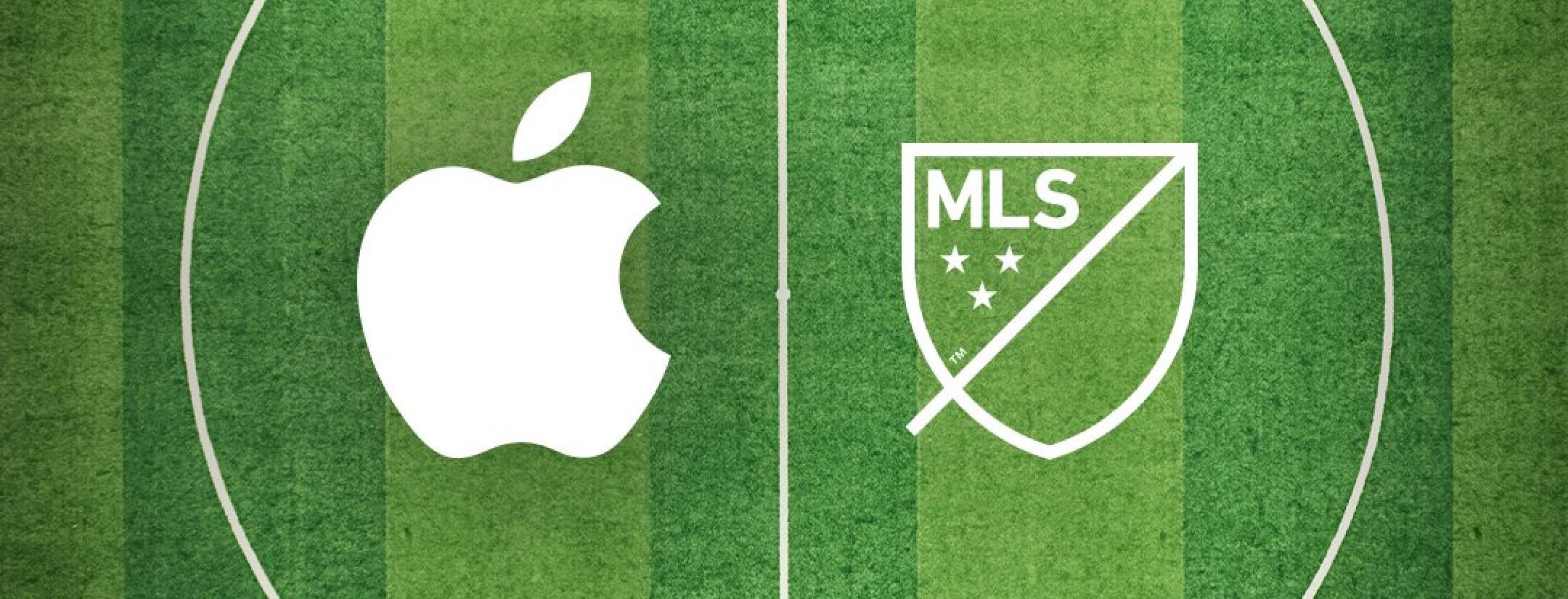Major League Soccer is going all in with Apple TV. The two entities announced an agreement worth a reported $2.5 billion, but no one can figure out if the MLS Apple TV deal is a good thing for soccer in the U.S.
The current MLS TV deal with ESPN, Fox and Univision expires at the end of the 2022 season. Previously, ESPN+ has been the streaming home of MLS matches. Starting in 2023, every match will be streamed exclusively on Apple TV.
Every club. Every match. Everywhere. Coming to the @AppleTV app, 2023.
Details: https://t.co/vkrUm1HzVN pic.twitter.com/jxPBI9aqMn
— Major League Soccer (@MLS) June 14, 2022
The Athletic reported the MLS Apple TV deal is worth $2.5 billion over 10 years, which equates to $250 million per year. This is a significant increase over the $65 million the league was reportedly receiving from ESPN, Univision and Fox from the old agreement. (The prior deal was worth $90 million per year, but $25 million went to U.S. Soccer as the contract included U.S. national team games.) MLS reportedly is still trying to close deals with the cable networks like ESPN and Univision to broadcast matches on TV, so the league could add to its already sizeable TV rights income.
For some comparison, NBC is paying $338 million per year for Premier League rights in the U.S. while ESPN is paying $175 million per year for LaLiga rights.
Here’s a quick rundown of what the MLS Apple TV deal entails:
- Every MLS and Leagues Cup match available through Apple TV (no need to pay for TV to watch games that are broadcast on TV elsewhere)
- A “broad selection” of MLS and Leagues Cup matches available to Apple TV+ subscribers
- To access every match, a subscription different from Apple TV+ will be required
- No local blackouts or other restrictions (except Leagues Cup matches, which will be unavailable in Mexico)
- Select MLS Next Pro and MLS Next matches will be streamed
- Live whip-around coverage every week
- Pregame, halftime, postgame shows, plus highlights, analysis, replays and original programming
- All MLS and Leagues Cup matches will include English and Spanish announcers, with French announcers available for any game with a Canadian club
- MLS season ticket holders will receive a free subscription
- Price has yet to be announced
What this means for soccer fans in the U.S. is a slight alteration in how you watch the games. The biggest change is needing the Apple TV app instead of ESPN+, which isn’t really a big deal as both are available just about everywhere. Otherwise, it’s nice every game will be available in one place. Previously a match broadcast on Fox or Univision wouldn’t be available on ESPN+.
On its face, this MLS Apple TV agreement seems great.
The money alone makes this a super deal for MLS clubs, who could see their pockets lined with twice as much income from TV rights. This means, in theory, more money invested into clubs, be it for improving academies or signing players. This isn’t far off from the $300 million MLS projected it would get on its next TV deal a few months ago, and the number could increase if the league is able to carve out additional TV agreements. (MLS is producing and paying production costs for all broadcasts, so some of that money will go toward paying the talent creating the broadcasts.)
Doing away with blackouts mean it’s now possible to watch your local team without access to a very specific channel. Having a singular place for fans to access MLS content means existing fans can easily find everything they want for one subscription without the need to pay for traditional TV. Personally, I’m a big fan of whip-around coverage, so I’m looking forward to having that as an option.
The Leagues Cup could be a huge draw in the future, as MLS and Liga MX clubs will face off in month-long tournaments starting in 2023. Apple TV appears to be betting this will be a popular tournament worth spending millions to broadcast, though it should be noted fans in Mexico will be unable to watch the games on Apple TV.
MLS x @AppleTV is coming in 2023.
Details: https://t.co/vkrUm1HzVN pic.twitter.com/CwvWv0zs18
— Major League Soccer (@MLS) June 14, 2022
Despite the obvious benefits of the deal, questions remain over how good of a deal this will be for MLS.
Is MLS Apple TV Good For Major League Soccer?
The biggest question mark is how many MLS games will be available on traditional TV. Casual soccer/sports fans might turn on a match when they see it’s on TV but would never seek out an MLS game on another streaming service. The Athletic reported MLS still wants to make a deal for TV broadcasts, but how much will ESPN or Univision want to put effort into airing matches that can be found on a rival service?
Previously, ESPN, Fox and Univision all broadcast dozens of matches per year each; decreasing that number could significantly hamper MLS fan growth. So while MLS diehards will finally have one place to watch all of the matches, casuals could be left behind.
As a fan, my first reaction to all of this news is to wonder how much it will all cost. Previously, ESPN+ was a great deal for soccer fans (personally I have the bundle with Hulu and Disney+). Apple TV+ currently doesn’t have any other sports, though it is cheaper at $50 per year or $5 per month.
The MLS Apple TV deal is careful to specify only some games will be available through an Apple TV+ subscription — instead, an additional subscription will be required to watch every match. Presumably this can be purchased separately from Apple TV+, though soccer fans might still want to subscribe to the service to watch Ted Lasso.
What this means is MLS is basically hosting its own streaming service on Apple TV. The price of this subscription service has not yet been revealed, so it’s impossible to say whether or not this MLS Apple TV deal is good for soccer fans. If it’s too expensive, no one will want to watch MLS and will instead watch other leagues, be it Premier League, LaLiga, Liga MX or NWSL.
Another big topic of discussion with the new deal is the disappearance of local broadcasts.
In the past, every team had its own local broadcast, much in the way other, non-NFL pro teams air most of their games. For many fans, this was their primary way to watch matches, but local broadcasts appear to be going the way of the dodo.
Stevenson: "What we anticipate is we will have a pregame show, halftime show, and postgame show for every one of our matches."
One national broadcast per match.
"Each club will have the ability to create local content shows within their market" like pregame shows, etc.
— Ryan Clarke (@RyanTClarke) June 14, 2022
There is one caveat: Fans will have the option to listen to the local radio announcers. Calling a game over radio is far different from calling a game on TV, so I have questions about how well that will work. Either way, many fans have already expressed displeasure over losing their local announcers, and those local announcers are currently wondering if they still have a job.
All local broadcasters are asking the same questions… https://t.co/Enqr88E9O4
— Brian Dunseth (@BrianDunseth) June 14, 2022
I’m on the phone with customer service. I’m getting phone numbers of the people in charge
— Ross Clark (@_ross_clark) June 14, 2022
Of course, someone will have to call the games on the national feed, so there will be jobs available, only that number could essentially be cut in half if there is only one broadcast per language per match. One wonders if Arlo White, recently ousted as the head soccer announcer at NBC, could be headed to Apple TV, where he has already appeared as the announcer in Ted Lasso.
Without a doubt, $2.5 billion is a huge get for Major League Soccer. The quality of play in the league is likely to continue to rise with this added investment, which should help the national teams of the U.S. and other Concacaf nations. The question remains over whether this will grow the popularity of the league.
Will fans sign up for the new subscription service? Or will fans be turned away by the decreased TV options, specifically local broadcasts? We’ll let you know in about five to 10 years.




